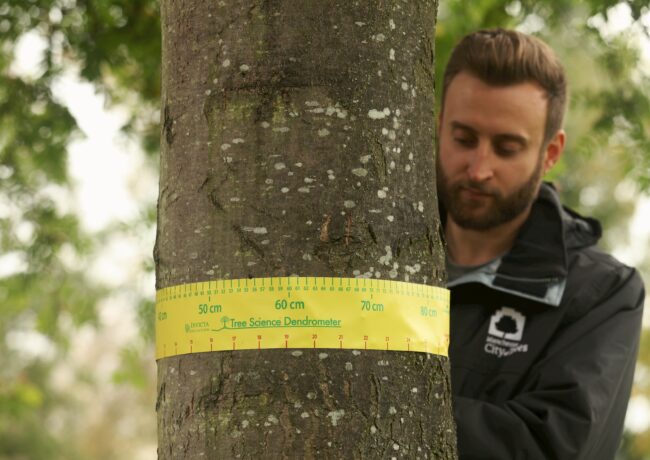Study reveals £33m value of Manchester’s trees
Greater Manchester’s 11.3m trees add £33m a year to the city region’s economy, according to a survey completed by City of Trees, however around 9% are at risk from pests and diseases.
The campaign group conducted one of the largest i-Tree Eco surveys outside of North America, which involved collecting data from more than 6,000 trees across 2,000 plots in Greater Manchester, and using i-Tree software which calculates the environmental and economic benefits that trees provide.
The results show that there are an estimated 11.3m trees with 15.7% of Greater Manchester beneath tree canopy.
The data also highlights that one million trees are in danger of being lost due to pests and diseases such as Ash Dieback and Horse Chestnut bleeding canker.
According to City of Trees, Greater Manchester’s trees act as a filtration system for harmful air pollutants, removing 847 tonnes of pollutants each year. They also assist with excessive storm water, absorbing 1.6m cubic metres of water run-off each year. Trees also process 56,530 tonnes of carbon each year, and the current carbon of all the trees in the region is 1.6m tonnes.
The i-Tree results showed that the total annual economic value of this air pollution filtration, storm water attenuation and carbon sequestration to Greater Manchester totalled £33m.
The survey was carried out across Greater Manchester this summer and autumn collecting data such as tree species, width, height and diameter.
Other results show:
- It would cost over £4.7bn to replace all Greater Manchester’s trees
- They produce 122,450 tonnes of oxygen each year
- The most common species of tree in Greater Manchester are Hawthorn, Sycamore and English Oak
The data will feed into initiatives such as The Northern Forest, and been included within the draft Greater Manchester Spatial Framework. The results will also inform the Greater Manchester Tree & Woodland Strategy, which will be published in spring next year.
A further report will make recommendations for managing woodlands to enhance biodiversity and create homes for wildlife, especially those in serious decline.
Bryan Cosgrove at City of Trees said: “The i-Tree figures show the crucial role our trees and woods play in combating climate change and ensuring our city region is more resilient for the future.
“By putting a price on Greater Manchester’s trees and woods we can ensure they are valued not just in terms of their amazing aesthetics but as natural assets providing a wealth of important environmental and economic benefits.”
The i-Tree Eco project All Our Trees has been supported by United Utilities, Viridor, Forestry Commission, Environment Agency, Salford City Council, Woodland Trust, Heritage Lottery Fund, The Greater Manchester Forest Partnership and the Greater Manchester Combined Authority.




